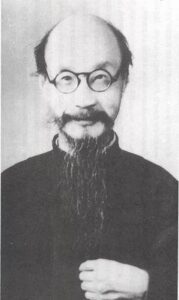Liu I-cheng (1879-), historian of the Tung-nan, school and librarian of the Chiang-su sheng-li t'u-shu-kuan at Nanking.
Tant'u, Kiangsi, was the birthplace of Liu I-cheng. His father died when Liu was only seven sui, and thereafter he lived in the home of his maternal grandfather, Pao Chung-ming. His mother tutored him in the Chinese classics, and he became a sheng-yuan in 1895 and began tutoring private students. In 1901 he went to Nanking, where he served as associate compiler at the Chiang-ch'u pien-i-chü [Kiangsu-Hupeh compilation and translation bureau], headed by Miao Ch'üan-sun (q.v.). In 1906 he taught for a short time in Peking and Mukden. He then returned to Nanking to become a professor of history at the Nanking Higher Normal School, which became Southeast University in 1923 and National Central University in 1927. One of his favorite students was Chang Ch'i-yün (q.v.), for whom he secured an appointment in 1927 as instructor in geography.
In 1924 Liu I-cheng also became the executive secretary of the Hsueh-heng [critical review], which opposed the pai-hua [vernacular] movement of Hu Shih (q.v.) and his associates. Many of Liu's earlier writings were published in the Hsüeh-heng.
Liu I-cheng's scholarly activities reflected his dual role as historian and librarian. Between 1921 and 1929 he founded in Nanking the Society of History and Geography, which published the Shih-ti hsueh-pao [journal for the study of historical geography], and the Historical Society, which published the Shih-hsueh tsa-chih [historiography magazine]. Among the frequent contributors to these magazines were Chang Ch'i-yün and Miao Feng-lin (1898-; T. Tsan-yü), who later joined with Liu in founding the Chung-shan shu-chü [Chung-shan book company] - and publishing the Kuo-feng pan-yueh k'an [Kuo-feng semi-monthly]. These three magazines became the forum for the Tung-nan [southeastern] school of historical studies, which had some influence on Chinese scholarship in the 1920's and 1930's.
In 1927 Liu I-cheng was appointed librarian of the Chiang-su sheng-li t'u-shu-kuan [Kiangsu provincial library]. Formerly known as the Chin-ling Lung-p'an-li t'u-shu-kuan [library of the Lung-p'an quarter of Nanking], the library had been founded by Miao Ch'üan-sun and financed by Tuan-fang (ECCP, Ü, 780-82). Its valuable holdings of rare books and manuscripts were second only to those of the National Peking Library. Under Liu I-cheng's direction, a number of the library's rare books were photographically reproduced and published. These included the Tsei-ch'ing hui-tsuan [collected materials concerning the rebel-thieves] and a set of three works devoted to the study of Manchuria under the Ming dynasty. In 1936 a catalogue of the library's holdings was published; it had been compiled by Fan His-tseng and Wang Huan-piao under the direction of Liu I-cheng.
Among Liu's articles in the Hsüeh-heng were "Wang Hsüan-ts'e shih-chi," which dealt with a Buddhist monk who visited India in 643, 648, and 657; "Han-kuan-i shih" [the history of debates among the bureaucracy of the Han dynasty]; "Hua-hua chien pei-shih" [studies in sinification], a study of Japan's search for and acceptance of Chinese culture; "Tu Mo wei-yen" [a note on Mo-tzu], proclaiming the supremacy of Mencius over Mo-tzu; "Wu-painien ch'ien Nan-ching chih kuo-li ta-hsüeh" [a national university established 500 years ago in Nanking], a study of the Imperial Academy established during the Ming period; and the "T'ang-tai ping-shu k'ao" [the number of soldiers during the T'ang dynasty]. His Chungkuo wen-hua shih [history of Chinese culture], which appeared in the Hsüeh-heng in 1929, was published as a book in 1932. That year also saw the appearance of his Li-tai ping-shu mu-lu [catalogue of military books through the dynasties].
Liu also published articles and bibliographical notes in the Bulletin of the Kiangsu Provincial Library. Among these articles were "Lu Paoching hsien-sheng nien-p'u" [chronological biography of Lu Pao-ching], a study of Lu Wen-ch'ao (ECCP, I, 549-50); "Nan-chien-shih t'an" [talks on the Nanking academy's recension of the twenty-one official dynastic histories]; "Tsu-p'u yen-chiu chü-li" [research in clan genealogies, with examples] ; "Chiangsu shu-yüan chih ch'u-kao: li-su-pien" [draft history of Kiangsu society: section on local rites and customs] ; and "Ming-tai Chiang-su wo-k'ou shih-chi" [collected accounts concerning the invasion of Kiangsu by Japanese pirates during Ming times], which appeared shortly after the Japanese attacked Mukden in September 1931.
In 1948 Liu I-cheng, who had become an official historian in the newly founded Kuo-shih kuan, was given the title of academician by the Academia Sinica. His Kuo-shih yao-i [the essence of Chinese history] was published in Shanghai in 1949.
柳诒徵东南学派史学家,南京江苏省立图书馆员.
柳诒徵生在江苏丹徒,七岁时,他父亲去世,比后即在外祖父家中生活, 由母亲敎以中国经史,1895年成秀才后开始收徒授业.1901年去南京任缪荃茹 创办的江楚编译局助理,1906年曾一度去北京、沈阳教书,回南京后任南京高 等肺范历史教席,该校于1923年改为东南大学,1927年改为国立中央大学.张 其的是他的得意门生,1927年他为张谋得地理科讲师之职.
1924年,柳诒徵任反对胡适等人白话文运动的《学衡)的桧书,他早期的著 作,大都发表在《学衡》上.
柳诒徵作为一个史学家和图书馆工作者所起的双重作用反映在他的学术活 动中.1921年到1929年间,他在南京创办了史地学会,出版《史地学报》,创 办历史学会,出版《史学杂志》,这两本杂志的经常撰稿人有张其财、缪凤林, 他们和柳诒徵以后一超创办T钟山书局,出版《国风半月刊》.上述三种杂志, 成为史学界东南学派的论坛,对二十.三十年代的中国学术界发生过一些影响.
1927年,柳诒截任江苏省立图书馆员,该馆前身即系端方出资,缪荃苏主 办的金陵龙盘里图书馆..该馆珍本和手稿的收藏量仅次于国立北京图书馆.在 柳诒徵主持下,影印出版了一些珍本书籍,其中有《贼情彙纂》以及三本研究 明朝时期东北情况的著作° 1930年出版了该馆藏书目录,这是在柳诒徵指导下 由范希曾、王焕镶所编.
柳诒徽发表在《学衡 > 上的文章有《王玄子事蹟》,该文是硏究公元643. 648.的?年访问印度的一个高僧.《汉官议史》,《华化》是研究日本追求和接 受中国文化的情况.《读星会要》宣称孟子胜于量子.《五百年前南京之国立 大学》研究明代太学,以及《唐代兵数考》.】929年的《学衡》还刊载他的《中 国文化史》,1932年成书出版,同年还出版了《历代兵书目录》,他在《江苏省立图书馆馆刊》上发表文章和书冃注解,其中有《卢抱经先 生年谱》,是研究卢文绍的作品,《南京史谈》、《族谱研究举例》.《江苏 书院制初稿'礼俗编》、《明代江苏倭寇事迹》一文发表于1931年9月日本进 攻沈阳后不久.
1948年,柳诒徵在新建的国史馆任职,被授予中央研究院士的职称.1949 年在上海出版了他的《国史要义》
